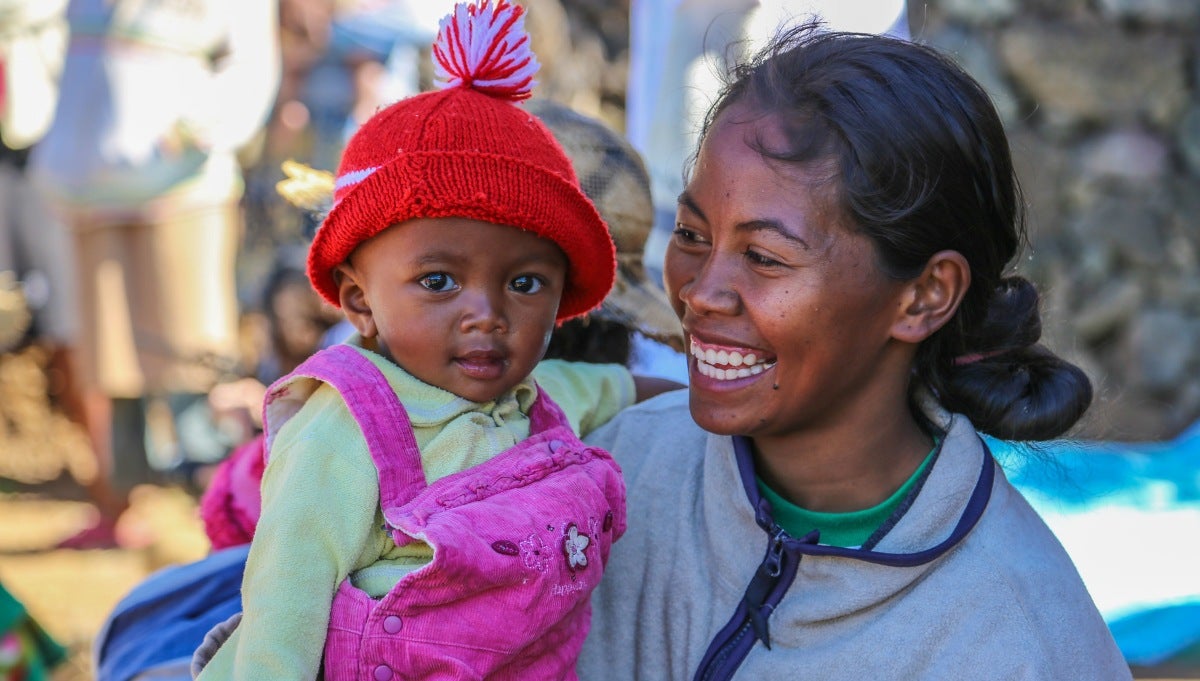 A young mother and her baby visit the local nutrition center in rural Madagascar to participate in a discussion around children's nutrition and learn new cooking recipes that promote a varied diet.
A young mother and her baby visit the local nutrition center in rural Madagascar to participate in a discussion around children's nutrition and learn new cooking recipes that promote a varied diet.
This blog is part of a series on Universal Health Coverage (UHC). The series includes contributions from external bloggers and reflects their views. Follow the conversation on Twitter #healthforall.
2019 is a crucial year to ensure that good nutrition is at the heart of the Universal Health Coverage Agenda. The G20 Leader’s Summit in Japan and the High-Level Meeting on Universal Health Coverage (UHC) at the UN General Assembly are opportunities to galvanise global commitment to ensure health and nutrition for all, recognizing the strong links to climate action and the fact that health and nutrition are human rights, preconditions, outcomes and drivers for sustainable development. It may sound like common sense, but we must not be complacent. Here is why:
Achieving UHC is vital for ending malnutrition, and UHC will not be achieved unless nutrition is at the center. Good nutrition, especially during a child’s critical first 1,000 days from pregnancy to age two, is the foundation for health, physical and cognitive development, as emphasized by the World Bank’s Human Capital Index. It will also catalyze implementation of the 2030 Agenda for Sustainable Development and its 17 Sustainable Development Goals.
Malnutrition is an underlying cause of almost half of child deaths. It makes children vulnerable to infections and illnesses and prevents them from developing to their full potential. At the same time, overweight, obesity, unhealthy diets, and childhood undernutrition are major underlying causes of noncommunicable diseases that cause 71% of all global deaths, placing enormous strains on health systems. A focus on prevention, not only treatment is crucial.
Integrating nutrition into UHC is the answer for combatting preventable child deaths and to invest in the health of adolescent girls, as well as pregnant and lactating women. The economics are clear - essential nutrition services are among the health interventions that save the most lives while giving the highest return on investment. They are a Best Buy – every dollar invested yields on average $16 in return.
Primary health care - with essential nutrition services integrated - is the cornerstone of sustainable health systems and should be prioritised when implementing UHC. Essential preventive, promotive and curative nutrition actions like breastfeeding, dietary counselling, management of acute malnutrition and provision of micronutrient supplements must be part of the core services delivered to everyone through the primary health care system, especially the most deprived and marginalised. Health workers at all levels, including Community Health Workers, should be trained in the delivery of key nutrition interventions and essential medicines should include nutrition-related health products. It is crucial for all stakeholders to support this approach, with a lead role for the World Health Organization.
Coordinated multi-sectoral and multi-stakeholder action is needed to achieve good nutrition. The health system has a crucial role in delivering key nutrition services to everyone to build a solid foundation for good health throughout the life-cycle. But not only health actors can address the challenge of malnutrition. Member countries of the SUN Movement are breaking down boundaries between sectors and stakeholders, developing a “systems approach” to nutrition. Each of the 61 SUN Countries lead their own unique national SUN Movement, which are joining forces with others on a global scale for joint advocacy, learning and support in adapting successful strategies for driving down all forms of malnutrition. Forty-two have costed multi-year national nutrition plans. These foundations are generating results.
To help unlock further progress in SUN member countries, and indeed all countries, nutrition must be integrated into global UHC policies and strategies and national UHC plans should be integrated and aligned with national multi-sectoral nutrition plans.
The political declaration for the High-Level Meeting on Universal Health Coverage on 23 September 2019, needs to include nutrition to lead the way.
I trust the World Bank will be a strong advocate for this, next to so many governments and stakeholders who want to see nutrition as a strong foundation for UHC. The Scaling Up Nutrition Global Gathering in Kathmandu, Nepal, 5-7 November 2019, and the 2020 Nutrition Summit in Tokyo, Japan, are opportunities to ensure all countries make strong commitments toward integrating nutrition into national UHC plans.
After all, nutrition is about building and sustaining human capital in every sense. It is a smart socio-economic investment. It is an investment in healthy populations. It is an investment in all of our futures.
Follow Gerda Verburg on Twitter
Follow the SUN Movement on Twitter


Join the Conversation